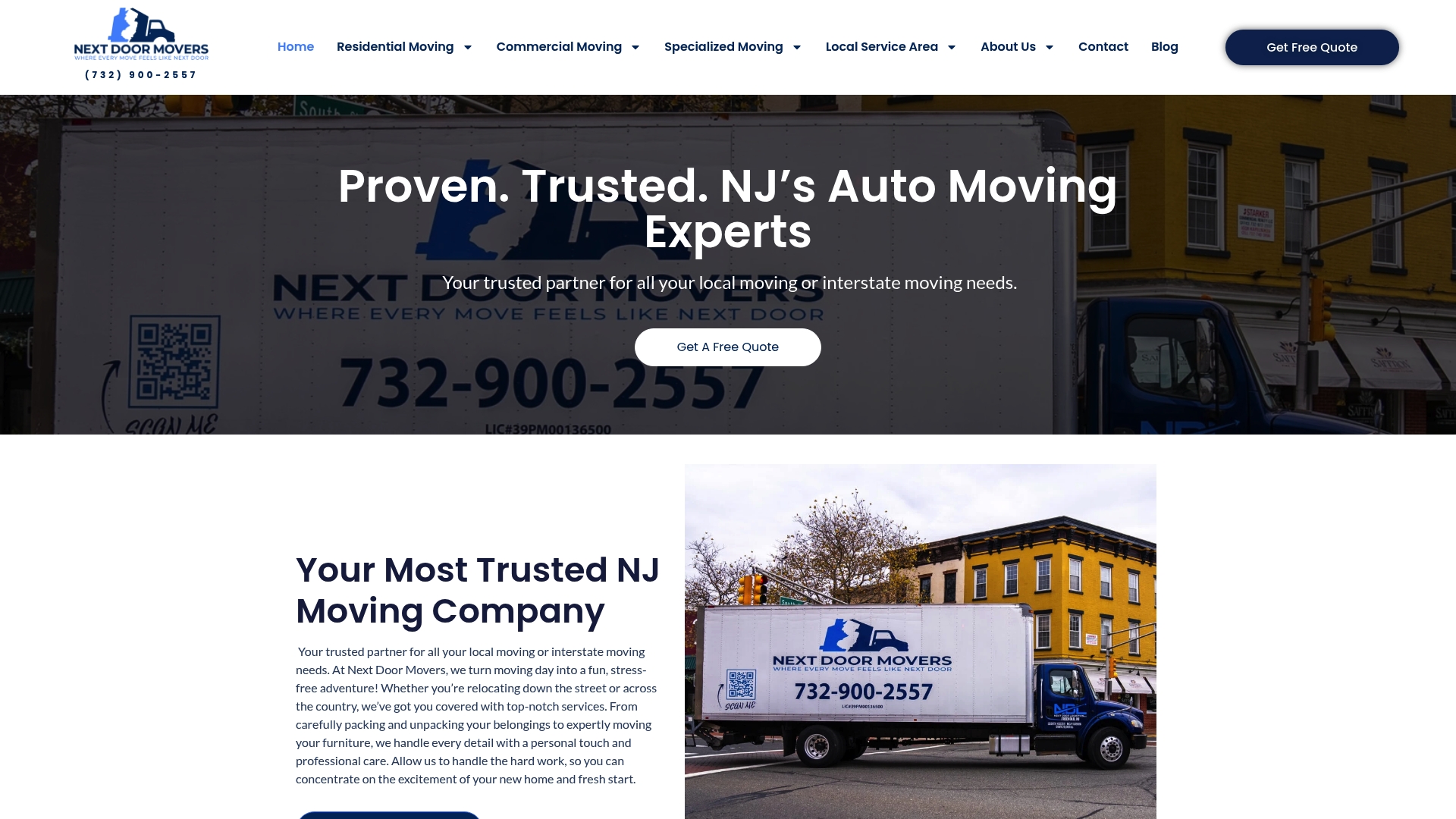Moving to a new home or office is a major undertaking and the logistics can be daunting. With over 30 million Americans moving each year, finding the right shipping moving company becomes crucial for a smooth transition. A professional mover does far more than just transport your belongings—they handle packing, organizing, insurance, and ensure your valuables arrive safely. Learning what these experts do empowers you to make informed decisions and avoid common headaches during your next move.
Table of Contents
- What Shipping Moving Companies Do
- Types of Moves and Specialty Services
- How Shipping and Moving Processes Work
- Costs, Insurance, and Pricing Factors
- Risks, Liabilities, and Industry Regulations
Key Takeaways
| Point | Details |
|---|---|
| Scope of Services | Shipping moving companies provide comprehensive services, including packing, transportation, and specialized handling of delicate items. |
| Legal Compliance | Interstate moving companies must adhere to federal regulations, including proper registration and insurance to ensure consumer protection. |
| Pricing Factors | Moving costs are influenced by distance, weight, additional services, and seasonal demand; consumers should obtain multiple estimates for clarity. |
| Risk Management | Understanding legal responsibilities and liability options is crucial for mitigating risks during the moving process and ensuring a successful relocation. |
What Shipping Moving Companies Do
Shipping moving companies are professional service providers specialized in transporting household and commercial goods from one location to another. According to the Federal Motor Carrier Safety Administration, these carriers own trucks, employ trained staff, and are responsible for comprehensively managing the physical movement of items.
These companies offer a wide range of services beyond simple transportation. Professional movers handle critical aspects of relocation, including:
- Packing fragile and valuable items
- Loading items safely into transportation vehicles
- Transporting goods across local, state, or national distances
- Unloading and placing items in new locations
- Providing specialized handling for unique or delicate possessions
To operate legally, interstate moving companies must meet strict federal regulations. As FMCSA guidelines mandate, these businesses are required to register with federal transportation authorities, possess a U.S. DOT number, and maintain appropriate insurance coverage. This ensures consumer protection and establishes professional standards within the moving industry.
The scope of moving services varies widely, ranging from basic transportation to full-service comprehensive moving solutions. Next Door Mover’s full-service packing and moving solutions can help streamline your relocation process by managing every aspect of your move professionally and efficiently.
Types of Moves and Specialty Services
Moving companies provide a diverse range of services tailored to meet various relocation needs. According to the Federal Motor Carrier Safety Administration, moving services can be categorized into several distinct types, each designed to address specific customer requirements.
Types of Moves include:
- Local Moves: Short-distance relocations within the same city or region
- Interstate Moves: Relocations crossing state boundaries
- Long-Distance Moves: Extensive relocations spanning multiple states or significant distances
- International Moves: Complex relocations involving international shipping and customs regulations
Specialty Services represent a critical aspect of professional moving solutions. As recommended by FIDI, professional movers offer specialized handling for unique and delicate items. These services typically encompass:
- Antique and artwork transportation
- Piano and large instrument moving
- Fine art and museum-quality item relocation
- High-value equipment and fragile item handling
- Climate-controlled storage solutions
Each specialty service requires unique expertise, specialized equipment, and carefully trained professionals. Next Door Movers: Full-Service Moving Professionals in NJ understand that different moves demand different approaches, ensuring your belongings receive customized care throughout the transportation process.
For complex or unique moving scenarios, consulting with professional movers who offer comprehensive specialty services can make a significant difference in the safety and success of your relocation.

How Shipping and Moving Processes Work
Shipping and moving processes involve a systematic approach designed to ensure safe, efficient transportation of belongings. According to the Federal Motor Carrier Safety Administration, the moving process encompasses several critical stages that require careful planning and execution.
Key Steps in the Moving Process:
- Initial Consultation and Estimate
- Detailed inventory of items to be moved
- On-site or virtual assessment of belongings
- Written estimate based on comprehensive inspection
- Preparation and Packing
- Professional packing of fragile and valuable items
- Proper labeling and categorization of belongings
- Use of specialized packing materials
- Transportation Logistics
- Selection of appropriate moving vehicles
- Route planning and optimization
- Careful loading and securing of items
As recommended by FMCSA guidelines, consumers must understand their responsibilities and the mover’s obligations. This includes reviewing contract terms, understanding liability options, and ensuring compliance with transportation regulations.
The final stages involve careful unloading, placement of items in the new location, and a comprehensive inventory check. Effortless Moving: Next Door Mover’s Full-Service Logistics demonstrate how professional movers streamline each phase of the moving process, providing a seamless experience from start to finish.
Understanding these intricate processes helps clients prepare for their move, set realistic expectations, and ensure a smooth transition to their new location.
Costs, Insurance, and Pricing Factors
Moving costs are complex and involve multiple considerations that impact the overall expense of relocation. According to the Federal Motor Carrier Safety Administration, several key factors directly influence moving pricing and insurance requirements.
Primary Pricing Factors:
- Distance of Move
- Total Weight of Shipment
- Volume of Belongings
- Additional Services Required
- Time of Year
- Complexity of Move
Insurance Protection Options:
- Full Value Protection
- Comprehensive coverage
- Replacement or repair of damaged items
- Highest level of protection
- Released Value Protection
- Minimal coverage
- Typically included at no additional charge
- Limited compensation based on weight
As recommended by FMCSA guidelines, consumers should obtain multiple written estimates through comprehensive inspections to understand potential expenses. Professional movers are required to provide transparent pricing and detailed liability information.
Next Door Mover: Affordable Full-Service Moving in NJ (2025) recommends obtaining binding estimates that lock in your total moving costs, helping you budget effectively and avoid unexpected financial surprises during your relocation process.
Understanding these intricate pricing structures empowers you to make informed decisions, ensuring you select a moving service that balances quality, reliability, and affordability.
Risks, Liabilities, and Industry Regulations
Navigating the complex landscape of moving industry regulations requires careful understanding of legal responsibilities and potential risks. According to the Federal Motor Carrier Safety Administration, consumers must be acutely aware of specific legal requirements that govern transportation and shipping processes.
Key Regulatory Compliance Areas:
- Mover Registration
- Insurance Requirements
- Liability Disclosure
- Transportation Safety Standards
- Hazardous Materials Restrictions
Potential Legal Risks Include:
- Transportation Violations
- Improper handling of restricted items
- Non-compliance with federal transportation regulations
- Potential fines and legal consequences
- Liability Exposure
- Limited protection for damaged or lost items
- Financial risks from inadequate insurance coverage
- Potential disputes during transportation
As recommended by FMCSA guidelines, consumers should thoroughly verify a moving company’s credentials, including their U.S. DOT number and current insurance status. This verification helps mitigate potential risks and ensures compliance with federal transportation regulations.
Understanding these intricate legal frameworks protects both consumers and moving companies, creating a transparent and accountable moving experience that prioritizes safety, reliability, and professional standards.
Experience a Stress-Free Move with Trusted Shipping Moving Experts
Moving can feel overwhelming with all the details and risks involved, from packing fragile items to navigating complex logistics and insurance. This guide highlights key challenges like coordinating packing, ensuring liability coverage, and meeting regulatory requirements that can leave many feeling anxious and unsure how to start. Next Door Mover understands these pain points and offers tailored solutions designed to protect your belongings and simplify every step of your relocation.

Choose Next Door Mover for professional moving services in New Jersey that cover everything from local and long-distance moves to specialty transportation of fine art, antiques, and pianos. We provide comprehensive packing, handling, and full-service logistics to give you peace of mind. Don’t let uncertainty and stress slow your move down. Visit our website now to get your free quote and discover how our experienced team ensures a smooth, reliable, and fully insured move at a competitive price.
Frequently Asked Questions
What services do shipping moving companies provide?
Shipping moving companies offer a range of services that include packing, loading, transporting, unloading, and placing items in new locations, as well as specialized handling for delicate or valuable possessions.
How does the moving process work?
The moving process typically involves an initial consultation for an estimate, preparation and packing of items, transportation logistics, and finally unloading and inventory checks to ensure safe delivery of belongings.
What factors affect the cost of hiring a moving company?
The cost of hiring a moving company can be influenced by distance, total weight or volume of belongings, time of year, complexity of the move, and any additional services required.
What insurance options are available when using moving services?
Moving companies generally offer two types of insurance: Full Value Protection, which covers repair or replacement of items, and Released Value Protection, which provides minimal coverage based on the weight of items moved.

